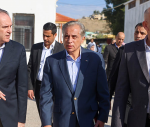You are here
US-Taliban deal leaves Afghanistan at the mercy of a radical group
Feb 25,2020 - Last updated at Feb 25,2020
A seven-day partial truce, which began last Friday, between the US and the Taliban in Afghanistan, is set to pave the way for the signing of a broader agreement on 29 February that would effectively end America’s longest war. Despite minor violations by the Taliban, the reduction of violence has been confirmed by the US during the week-long truce. It’s the first negotiated pause of hostilities between the two sides and it took over of a year of on and off talks in Doha to reach this stage.
If all goes as planned, the long-term agreement would lead to the withdrawal of at least 5,000 US soldiers, out of 12,000, in the first half of this year. The rest will be pulled out gradually over a period of three years leaving a small counterterrorism force behind. On its part, the Taliban will commit not to conduct terrorist attacks against the US and its allies and not allow other groups to use its territory for such attacks. Moreover, the Taliban will also commit to engage in intra-Afghan talks, which includes the government, which it had so far refused to recognise. The end game, presumably, would see the Taliban becoming a political party and embrace a power-sharing agreement. But there are no guarantees that this would be the path taken.
The two sides were close to reaching an agreement last September, when President Donald Trump announced that he would host the Taliban at Camp David. The move was criticised by both Republicans and Democrats, and Trump cancelled the invitation.
But while the sealing of the deal appears plausible, it goes without saying that it leaves the fragile Afghan government, which took no part in the negotiations, with little leverage. The Taliban has not committed to a long-term ceasefire or to ceding territory it controls to the government. In fact, the short pause in hostilities and the subsequent deal with the US serve to bolster the Taliban as a legitimate player in Afghan politics if not more. As the US withdraws its troops, the Taliban would only seek to extend its control over additional territory. The deal, which is yet to be disclosed, may not address safeguarding the constitution, democratic path and even women’s rights; all denied by the Taliban.
Without guarantees to engage peacefully in a peace process, the Afghan government, under Ashraf Ghani, will be left in a weak position. Ghani himself is being challenged by opponents following an inconclusive election. It has been said that the US-Taliban deal leaves the Kabul government to fend for itself against a stubborn and dangerous enemy. The Taliban, which sees the US withdrawal as a victory, would bide its time before moving in and conquering the legitimate government.
This is a classic American manoeuvre to save its own while abandoning an ally. It happened before in Vietnam and it looks like it will happen in Afghanistan. The US ventured into this country more than 19 years ago, following the 9/11 terrorist attacks, and since then it has looked for ways to get out. To this day there are arguments regarding the legality of the US action. From the US side, the war had cost the lives of more than 2,400 servicemen and more than 20,000 wounded. For the Afghans, the price was much higher: About 147,000 people have been killed since 2001; more than 38,000 of those killed have been civilians. There is no doubt that the US has committed war crimes in Afghanistan, but the possibility of assuming responsibility for such crimes is nil.
The reality is that the US has failed to defeat the Taliban and now it has recognised it by striking a deal with a movement that was associated with Al Qaeda and continues to embrace a fundamentalist extremist dogma. And now it is taking steps to abandon the Afghan people. The chances for a successful peace track evolving as the US begins its withdrawal are minimal. Talks, which are set to begin within ten days after the signing of the deal, will linger on, the two sides have little in common and the Taliban will remain engaged until the last US soldier has left.
Instead, the US should have called on other parties, like Russia and China, to join an internationally sponsored peace conference on Afghanistan. The objective should have been to guarantee and safeguard Afghanistan’s fragile democracy and the rights of its people, especially women. Other than that, the upcoming deal is no more than a fig leaf to cover America’s defeat and hasty withdrawal that would only lead to the Taliban fulfilling its revisionist dogma.
Osama Al Sharif is a journalist and political commentator based in Amman












